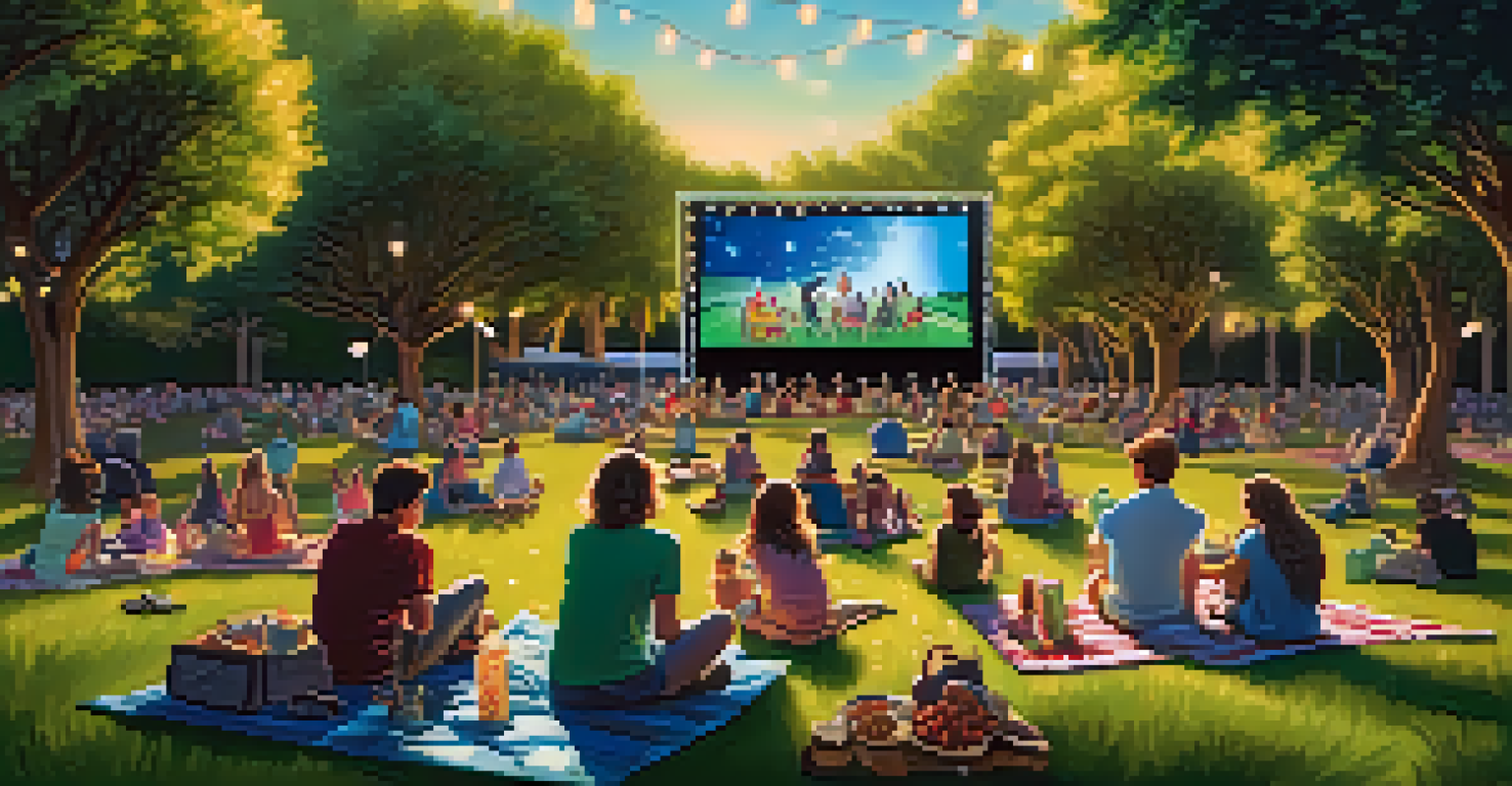Cultural Adaptations: Hollywood's Influence on Global Storytelling

Hollywood's Global Reach: A Cultural Powerhouse
Hollywood has long been considered a dominant force in global cinema, shaping narratives and cultural perceptions around the world. With its vast resources and marketing prowess, Hollywood films reach audiences in every corner of the globe, often overshadowing local productions. This influence extends far beyond box office numbers; it impacts cultural norms, values, and even language, making Hollywood a cultural powerhouse.
The power of storytelling is not just in the stories themselves, but in the connections they create between people from different cultures.
For instance, consider how American superhero films have inspired a wave of similar productions in countries like South Korea and India. These adaptations often blend local cultural elements with Western storytelling techniques, creating a unique hybrid that resonates with audiences. This cross-pollination of ideas not only entertains but also fosters a greater understanding of different cultures.
However, this influence can also spark debates about cultural imperialism, where local stories and traditions might be overshadowed by Hollywood's dominant narratives. The challenge lies in finding a balance between embracing global influences and preserving local storytelling traditions.
Cultural Adaptations: Blending Local and Global Narratives
As Hollywood's influence permeates various cultures, filmmakers often adapt stories to better resonate with local audiences. This cultural adaptation can lead to fresh takes on familiar tales, making them more relatable and meaningful. For example, the Indian film industry has produced numerous adaptations of Hollywood blockbusters, incorporating local customs, humor, and values.

Take the Bollywood rendition of 'The Fault in Our Stars,' which not only features the same plot but also infuses it with the intricacies of Indian relationships and societal expectations. Such adaptations highlight the importance of cultural context in storytelling, allowing filmmakers to connect with audiences on a deeper level. It’s a beautiful reminder that while stories may travel, they can also transform.
Hollywood Shapes Global Narratives
Hollywood's dominance in cinema influences cultural norms and storytelling across the globe.
Moreover, this blending of narratives creates a rich tapestry of storytelling that reflects a globalized world. It encourages diversity in representation and showcases the unique perspectives of different cultures, ultimately enriching the cinematic landscape.
The Role of Streaming Services in Cultural Exchange
The rise of streaming services like Netflix and Amazon Prime has accelerated the cultural exchange between Hollywood and global cinema. These platforms not only provide access to a vast library of films but also invest in original content from various regions, helping to amplify local voices. As a result, viewers are exposed to a wider array of storytelling styles and cultural narratives that they may not have encountered otherwise.
Diversity is not a reason for division, but a reason for connection through shared experiences and stories.
For instance, Netflix's 'Money Heist' from Spain gained immense popularity worldwide, leading to adaptations and inspired projects in various countries. This phenomenon demonstrates how a single story can transcend borders, capturing the imagination of diverse audiences. Streaming services have effectively democratized access to global content, allowing stories from different cultures to shine.
However, this accessibility comes with its own set of challenges. As more local filmmakers seek to create content for international audiences, there is a question of authenticity—how to stay true to one’s cultural roots while appealing to a broader audience. Finding that sweet spot is crucial to maintaining the integrity of storytelling.
Representation Matters: Voices From the Margins
Hollywood's influence on global storytelling also raises important questions about representation. Traditionally, many stories have been told from a Western perspective, often sidelining voices from marginalized communities. However, recent trends show a shift towards more inclusive narratives, with filmmakers from various backgrounds gaining recognition and opportunities to share their stories.
Consider the critical acclaim received by films like 'Parasite' from South Korea, which not only won numerous awards but also sparked discussions about class, privilege, and societal structures. Such films challenge the notion that only Hollywood can produce compelling stories, proving that diverse perspectives can resonate powerfully across cultures.
Cultural Adaptations Enrich Storytelling
Filmmakers blend local customs with Hollywood narratives, creating unique adaptations that resonate with audiences.
This growing recognition of underrepresented voices fosters a more nuanced understanding of global issues, encouraging empathy and connection among audiences. As we continue to embrace diverse storytelling, we move closer to a cinematic landscape that reflects the richness of human experience.
The Impact of Cultural Appropriation in Film
As Hollywood continues to influence global storytelling, the issue of cultural appropriation has come to the forefront. Cultural appropriation occurs when elements of one culture are taken and used by another, often without understanding or respecting their significance. This can lead to misrepresentation and perpetuation of stereotypes, which can be particularly harmful.
A notable example is the criticism faced by films like 'Avatar,' which many felt borrowed heavily from Indigenous cultures without giving proper credit. These instances highlight the importance of cultural sensitivity and the need for authentic representation in storytelling. Filmmakers must be mindful of the stories they choose to tell and the voices they elevate.
This discussion encourages a more collaborative approach, where creators from different backgrounds work together to tell stories that honor their origins. By fostering a respectful dialogue around cultural exchange, we can enrich global storytelling without falling into the pitfalls of appropriation.
The Future of Global Storytelling in a Digital Age
As we look to the future, the digital age is set to transform global storytelling in unprecedented ways. With advancements in technology, filmmakers can now create and share their stories more easily than ever before, reaching audiences far beyond their local markets. This democratization of storytelling presents exciting opportunities for diverse voices to emerge.
Social media platforms also play a crucial role in this evolution, allowing creators to connect directly with their audiences and garner support for their projects. For example, short films and web series produced by independent filmmakers can gain traction through platforms like YouTube and Instagram, showcasing stories that might have been overlooked by traditional studios.
Streaming Services Foster Diversity
Platforms like Netflix democratize access to global content, amplifying diverse voices and cultural narratives.
However, as the landscape becomes increasingly crowded, filmmakers must find innovative ways to stand out. Balancing authenticity with the demands of a global audience will be key to navigating this new era of storytelling. The future promises to be vibrant and diverse, reflecting the rich tapestry of human experience across cultures.
Conclusion: Embracing the Power of Storytelling
In conclusion, Hollywood's influence on global storytelling is a complex interplay of adaptation, representation, and cultural exchange. As filmmakers around the world draw inspiration from each other, they create a rich mosaic of narratives that reflect both local and global experiences. This evolution not only entertains but also fosters understanding and empathy among diverse audiences.
The challenge lies in ensuring that this exchange remains respectful and authentic, honoring the roots of the stories being told. By prioritizing collaboration and representation, we can create a cinematic landscape that celebrates diversity and encourages meaningful dialogue.

As we embrace the power of storytelling, let us remember that every culture has its own unique tales to share. By listening to and amplifying these voices, we can continue to enrich our understanding of the world and foster a deeper connection to one another.